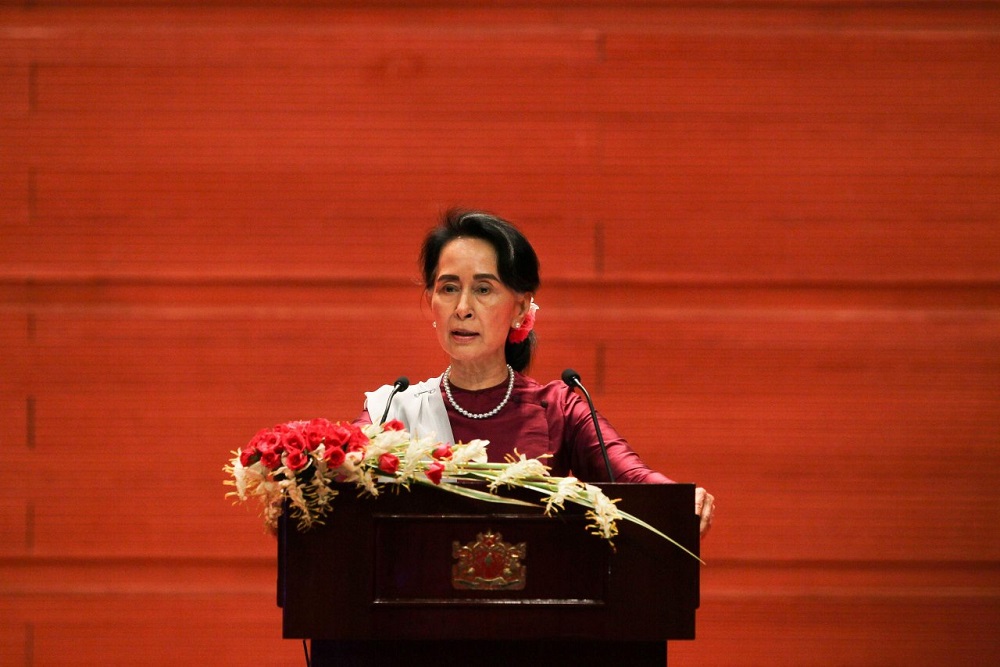In her first public remarks on the violence against Rohingya Muslims, Myanmar leader Aung San Suu Kyi condemned on Tuesday any human rights violations in the turbulent Rakhine state as rights groups said a systematic purge was being committed against the minority ethnic group.
Suu Kyi added that anyone responsible for violations would face the law and that she felt deeply for the suffering of everyone caught up in the conflict there.
More than 410,000 Rohingya have been forced out of Myanmar in Bangladesh as government forces cracked down on insurgents, whose attack on a military post on August 25 sparked the unrest.
Western diplomats and aid officials attending the Suu Kyi’s national address welcomed her message, though some doubted if she had said enough to end the barrage of global criticism Myanmar has faced.
Human rights groups were dismissive. Amnesty International said Suu Kyi and her government were “burying their heads in the sand” for ignoring the role of the army in the violence.
“This is the worst crisis in Rohingya history,” said Chris Lewa, founder of the Arakan Project, which works to improve conditions for the ethnic minority, citing the monumental size and speed of the exodus. “Security forces have been burning villages one by one, in a very systematic way. And it’s still ongoing.”
Using a network of monitors, Lewa and her agency are meticulously documenting tracts of villages that have been partially or completely burned down in three townships in northern Rakhine state, where the vast majority of Myanmar’s 1.1 million Rohingya once lived.
It’s a painstaking task because there are hundreds of them, and information is almost impossible to verify because the army has blocked access to the area. Satellite imagery released by Human Rights Watch on Tuesday shows massive swaths of scorched landscape and the near total destruction of 214 villages.
The United Nations has branded the military operation in the western state ethnic cleansing. Suu Kyi did not address that but said her government was committed to the rule of law.
“We condemn all human rights violations and unlawful violence. We are committed to the restoration of peace and stability and rule of law throughout the state,” Suu Kyi said in her address in the capital, Naypyitaw.
Long feted in the West for her role as champion of democracy in the Buddhist-majority country during years of military rule and house arrest, Suu Kyi has faced growing criticism for saying little about the abuses faced by the Rohingya.
“Action will be taken against all people regardless of their religion, race and political position, who go against the law of the land and violate human rights,” she said.
“We feel deeply for the suffering of all the people caught up in the conflict.”
The United States urged Myanmar on Monday to end military operations, grant humanitarian access, and commit to aiding the safe return of civilians to their homes.
Myanmar’s generals remain in full charge of security and Suu Kyi did not comment on the military operation, except to say that there had been “no armed clashes and there have been no clearance operations” since September 5.
“Nevertheless, we are concerned to hear that numbers of Muslims are fleeing across the border,” she said.
“We want to find out why.”
Rights monitors and fleeing Rohingya say the army and Rakhine Buddhist vigilantes have mounted a campaign of arson aimed at driving out the Muslim population.
Referring to Suu Kyi’s assertion that army clearance operations had ceased, Phil Robertson of Human Rights Watch asked: “If that is true, then who is burning all the villages we’ve seen in the past two weeks?”
He said it was time that Suu Kyi, the government and military faced the fact that the security forces “don’t follow a code of conduct and shoot and kill who they want” and burn villages.
Amnesty International said there was “overwhelming evidence” the security forces were engaged in ethnic cleansing.
“While it was positive to hear Aung San Suu Kyi condemn human rights violations in Rakhine state, she is still silent about the role of the security forces,” the group said.
While foreign critics raised doubts, thousands of Suu Kyi’s cheering supporters gathered in the main city of Yangon and other towns to watch her speech broadcast on big screens.
The ambassador of China, which vies with the United States for influence in Myanmar, welcomed Suu Kyi’s speech saying it would improve understanding. Russia’s ambassador said there was no evidence of ethnic cleaning.
